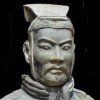Quotations by:
Sun-Tzu
Know the enemy, know yourself; in a hundred battles you will not be in peril.
Sun-Tzu (fl. 6th C. AD) Chinese general and philosopher [a.k.a. Sun Wu]
The Art of War, “Offensive Strategy” (31) [tr. S. Griffith (1963)]
Alt trans:
- "It is said that if you know your enemies and know yourself, you will not be imperiled in a hundred battles; if you do not know your enemies but do know yourself, you will win one and lose one; if you do not know your enemies nor yourself, you will be imperiled in every single battle." [cited ch. 3, last sentence.]
- "If you know others and know yourself, you will not be imperiled in a hundred battles; if you do not know others but know yourself, you win one and lose one; if you do not know others and do not know yourself, you will be imperiled in every single battle."
- "Know your enemy and know yourself, find naught in fear for 100 battles. Know yourself but not your enemy, find level of loss and victory. Know thy enemy but not yourself, wallow in defeat every time."
- "If you know the enemy and know yourself, you need not fear the result of a hundred battles. If you know yourself but not the enemy, for every victory gained you will also suffer a defeat. If you know neither the enemy nor yourself, you will succumb in every battle."
- Literal translation: "Know [the] other, know [the] self, hundred battles without danger; not knowing [the] other but know [the] self, one win one loss; not knowing [the] other, not knowing [the] self, every battle must [be] lost."
All warfare is based on deception. Hence, when we are able to attack, we must seem unable; when using our forces, we must appear inactive; when we are near, we must make the enemy believe we are far away; when far away, we must make him believe we are near.
If your enemy is secure at all points, be prepared for him. If he is in superior strength, evade him. If your opponent is temperamental, seek to irritate him. Pretend to be weak, that he may grow arrogant. If he is taking his ease, give him no rest. If his forces are united, separate them. If sovereign and subject are in accord, put division between them. Attack him where he is unprepared, appear where you are not expected.
It is the rule in war, if ten times the enemy’s strength, surround them; if five times, attack them; if double, engage them; if equal, be able to divide them; if fewer, be able to evade them; if weaker, be able to avoid them.
For to win one hundred victories in one hundred battles is not the acme of skill. To subdue the enemy without fighting is the acme of skill.
Sun-Tzu (fl. 6th C. AD) Chinese general and philosopher [a.k.a. Sun Wu]
The Art of War, ch. 3
Alt. trans.:
- "Hence to fight and conquer in all your battles is not supreme excellence; supreme excellence consists in breaking the enemy's resistance without fighting"
- "The best victory is when the opponent surrenders of its own accord before there are any actual hostilities .... It is best to win without fighting."

